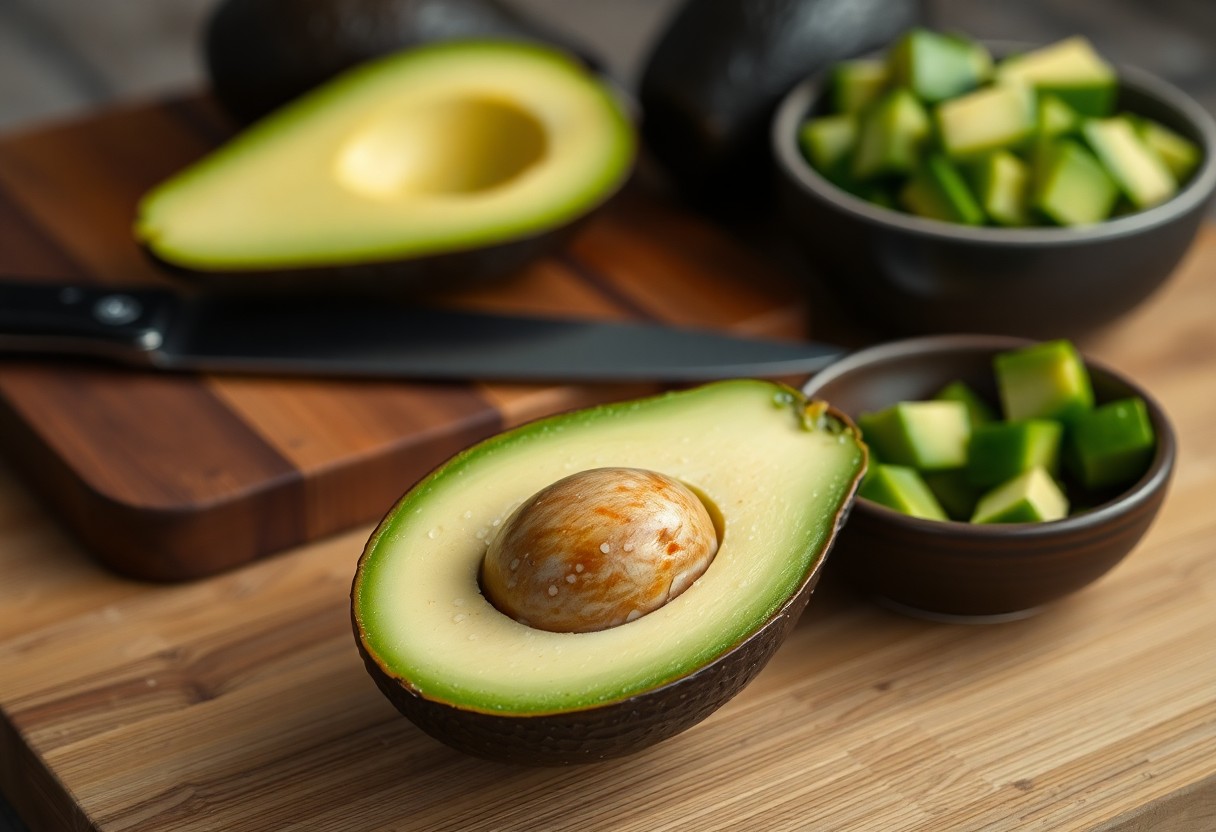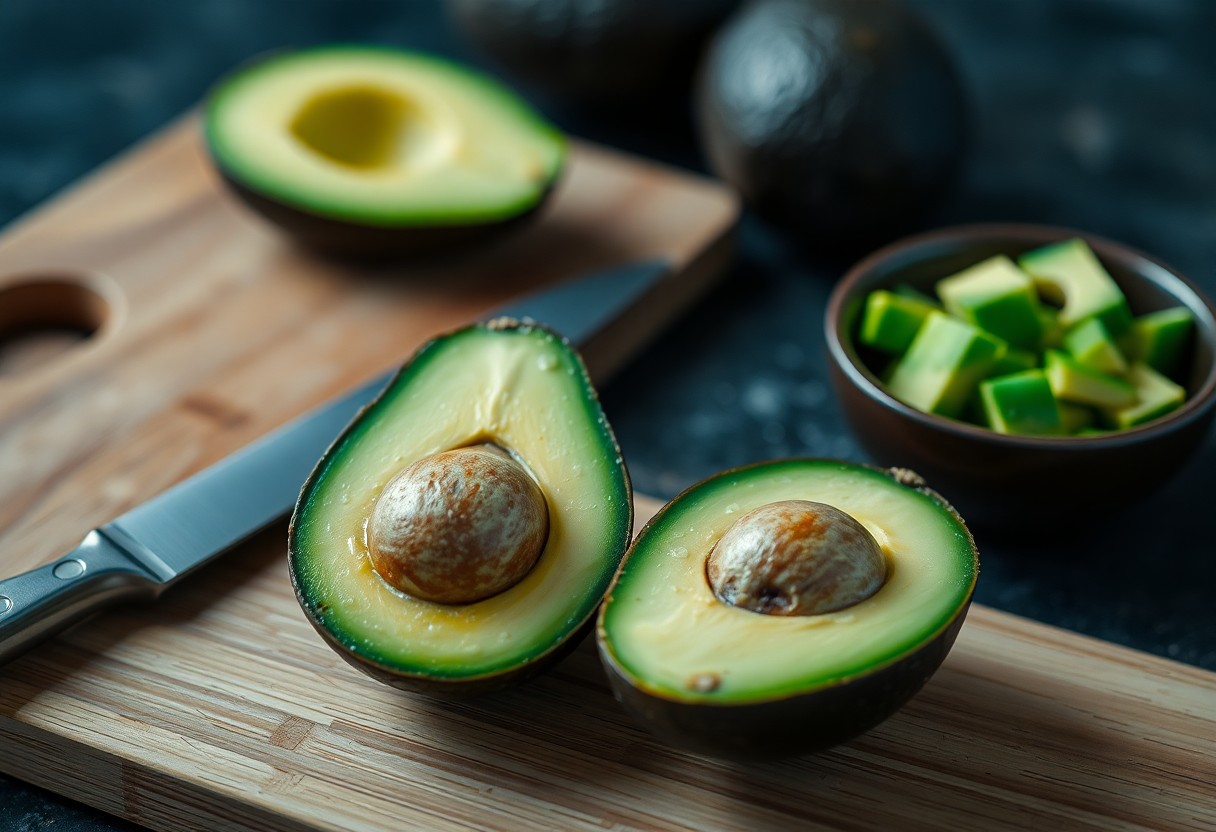Over time, you may have come across claims about the health benefits of avocado seeds, which are packed with nutrients and antioxidants. However, it’s vital to prepare them properly to avoid any potential health risks. In this guide, you will learn how to safely prepare and consume avocado seeds to enjoy their benefits without compromising your health. With the right techniques, you can incorporate this often-discarded part of the avocado into your diet and boost your wellness.
Key Takeaways:
- Avocado seeds should be thoroughly washed and peeled before consumption to remove any residues or toxins from the skin.
- To prepare the seed, it can be dried, blended into a powder, or grated, and then incorporated into smoothies, baked goods, or sprinkled on salads for added nutrients.
- Start with small amounts of avocado seed in your diet, as they contain high levels of fiber and may cause digestive discomfort if consumed in large quantities.

The Nutritional Goldmine: Avocado Seeds Unpacked
Delving into the nutritional profile of avocado seeds reveals a surprising treasure trove of health-boosting components. Packed with fiber, antioxidants, and beneficial fatty acids, these seeds offer impressive nutritional value that can complement a balanced diet. One avocado seed can contain approximately 70% of the fruit’s total antioxidants, making it a worthy addition to your health regimen.
Key Nutritional Components
Avocado seeds are rich in dietary fiber, which supports digestive health and can aid weight management. They also boast an array of antioxidants, including flavonoids, which combat oxidative stress in the body. Furthermore, you’ll find crucial minerals such as potassium and magnesium, crucial for maintaining heart health and overall bodily functions.
Health Benefits Explored
Adding avocado seeds to your diet can lead to significant health improvements, particularly in terms of improving digestion and potentially reducing inflammation. The high fiber content keeps your digestive system running smoothly, aiding in regularity and weight control. Additionally, the antioxidants in these seeds may help lower the risk of chronic diseases such as heart disease and diabetes.
Launching a deeper exploration into health benefits uncovers even more potential advantages. Studies indicate that the antioxidants found in avocado seeds can enhance immune function and combat the effects of aging on the body. Ongoing research highlights that the bioactive compounds may reduce cholesterol levels, promoting better cardiovascular health. With various forms of preparation like blending into smoothies or incorporating into dishes, the potential for harnessing these benefits is vast, making avocado seeds worthy of consideration in your health journey.
Preparing Avocado Seeds for Consumption
Getting avocado seeds ready for consumption involves a few simple steps to ensure safety and maximize their nutritional benefits. First, you’ll need to remove the seed from the fruit while ensuring it doesn’t get bruised. Once that’s done, you can prepare it for further treatment, focusing on proper cleaning and drying techniques to get the best results.
Cleaning and Drying Techniques
To clean your avocado seed, rinse it under cool running water to remove any fruit residue. You can use a soft cloth or sponge to gently scrub the surface. After cleaning, let the seed dry completely on a towel or drying rack for about 12 hours. This step is crucial because it prevents mold growth during storage.
Effective Grinding and Storage Methods
Once the seed has dried, it needs to be ground into a fine powder to enhance palatability and nutrient absorption. Use a high-powered blender or food processor for best results. After grinding, store the powder in an airtight container in a cool, dark place. Properly stored, the ground seed can remain viable for up to six months. Additionally, consider portioning the powder into smaller containers to maintain freshness and prevent exposure to moisture.
For grinding the seed, it’s beneficial to also slice it into smaller pieces before processing. This method ensures a finer grind and reduces the strain on your blender. You can store ground avocado seed powder in the refrigerator for added longevity. When ready to use, sprinkle the powder over smoothies, salads, or baked goods. Incorporating ground avocado seed powder into your diet can be a great way to take advantage of its potential health benefits.
Delicious Ways to Incorporate Avocado Seeds
Exploring flavorful ways to enjoy avocado seeds can elevate your meals while adding a nutritional boost. There are several methods to integrate these seeds into your diet, adapting them into various dishes for both taste and health benefits. By being creative with their culinary applications, you can easily enjoy the unique texture and subtle flavor of avocado seeds while reaping their numerous advantages.
Culinary Uses and Recipe Ideas
Avocado seeds can be transformed into delicious additions for numerous recipes. Grate or blend the dried seed into powder and incorporate it into smoothies for an added dose of fiber. Use it as a flour substitute in baked goods or mix it into homemade granola bars for a nutrient-rich snack. You may also sprinkle avocado seed powder over salads, soups, or vegetable dishes to enhance both flavor and health.
Enhancing Other Foods with Avocado Seed Powders
Adding avocado seed powders to your meals not only boosts the nutritional profile but also adds a subtle earthy flavor. Try mixing a tablespoon of this powder into your morning oatmeal or yogurt for an extra punch of antioxidants and fiber. Blend it into your homemade sauces, dips, or dressings, allowing the flavor to complement your dishes without overpowering them.
Experimenting with avocado seed powders opens a world of culinary creativity. This ingredient works well in savory and sweet applications alike. You can stir it into pancake or muffin batter, enriching your breakfast. Consider using the powder as a meat rub, enhancing the savory notes of grilled or roasted proteins. The nutty essence makes avocado seed powder a versatile option, whether you’re adjusting favorite recipes or inventing new ones that benefit from its unique contributions.

Potential Risks and Precautions
Handling avocado seeds comes with certain risks that are important to be aware of. Potential allergens present in the seeds can lead to gastrointestinal discomfort or reactions in sensitive individuals. Additionally, the instructions for preparation must be followed carefully; consuming seeds in their raw form could expose you to harmful compounds. Safety measures, such as storing prepared seeds properly and keeping portions moderate, can enhance your experience while safeguarding your health.
Understanding Allergic Reactions
Some individuals may experience allergic reactions to avocado seeds, which could manifest as skin rashes, digestive issues, or respiratory problems. If you have a known allergy to avocados or latex, proceed with caution and consider consulting a healthcare professional before incorporating the seeds into your diet. Recognizing symptoms early can help prevent more severe reactions from occurring.
Moderation: How Much is Safe?
Consuming avocado seeds in moderation is important to avoid potential adverse effects. Experts recommend starting with just a small amount, such as 1/10th of a seed, to assess your body’s response. Gradually increasing the intake can help you gauge your tolerance without overloading your system. Balance and moderation are key.
Even with known benefits, the specific amount you consume should be tailored to your individual health and dietary needs. Consuming too much of the seed may lead to digestive issues, given their high fiber content. Regular meals should still maintain a well-rounded nutritional profile, so pairing smaller amounts of avocado seed with other sources of nutrients is wise. Ultimately, staying tuned to how your body reacts will guide you in determining safe consumption levels.
Breaking the Myths: Debunking Common Misconceptions
Myths Surrounding Avocado Seed Toxicity
Many mistakenly believe that avocado seeds are toxic, but scientific studies indicate otherwise. While it’s true that some avocado varieties contain a higher concentration of persin, a compound that can be harmful in large amounts, the amount in seeds is minimal and generally considered safe for human consumption. In moderation, you can enjoy avocado seeds without fear, especially when properly prepared.
The Truth About Avocado Seed Popularity
Avocado seeds have gained attention in health circles due to their nutritional benefits. Packed with fiber and antioxidants, they offer various health advantages, including potential anti-inflammatory properties. As you explore this growing trend, it’s important to assess whether the benefits exceed the practicality of incorporating seeds into your diet.
The rising popularity of avocado seeds can be attributed to research revealing their potential health benefits, which include antioxidant properties that might aid in reducing oxidative stress. Health enthusiasts are increasingly incorporating powdered seeds into smoothies, baked goods, and even salads. By doing so, they harness the seeds’ nutritional potential while enjoying subtle flavors. However, personal preferences and taste must also be considered, as the texture can be gritty if not fully blended. As avocado seeds continue to attract interest, gauging their effectiveness for your unique dietary goals becomes vital.
To wrap up
Drawing together the insights on safely preparing and eating avocado seeds, you can confidently incorporate them into your diet by following proper preparation techniques, including thorough washing, drying, and grinding. This approach maximizes nutritional benefits while minimizing any potential risks. Enjoy experimenting with your recipes, whether adding the ground seeds to smoothies or baked goods, as you explore the unique flavors and health benefits they offer. Always listen to your body and consult a healthcare professional if you have concerns about introducing new foods into your diet.
FAQ
Q: Can I eat avocado seeds raw?
A: Eating avocado seeds raw is not recommended. Raw seeds contain compounds that may be difficult for the body to digest and can potentially cause gastrointestinal discomfort. It’s best to prepare them by drying, roasting, or blending them into a powder before consumption.
Q: What is the best way to prepare avocado seeds for consumption?
A: To prepare avocado seeds safely, start by removing the seed from the avocado and rinsing it under water. After that, dry the seed thoroughly. You can either roast it in the oven at a low temperature (around 200°F or 93°C) for about an hour, or you can cut it into smaller pieces and blend it into a fine powder. This powder can then be added to smoothies, salads, or other dishes for nutrition.
Q: Are there any health benefits to consuming avocado seeds?
A: Avocado seeds are known to be high in antioxidants, fiber, and various nutrients, which may offer potential health benefits, such as improved digestion and enhanced immune function. However, more research is needed to understand the full extent of the benefits. Moderation is key, as consuming large amounts may lead to digestive issues.
Q: How can I incorporate avocado seed powder into my diet?
A: Avocado seed powder can be easily integrated into your diet by adding it to smoothies, oatmeal, or yogurt for an extra boost of nutrients. You can also sprinkle it on salads or mix it into baked goods like muffins or pancakes. Just start with small amounts to assess your body’s reaction and gradually increase as desired.
Q: Are there any risks associated with eating avocado seeds?
A: While avocado seeds can provide some nutritional benefits, consuming them in excessive amounts may lead to digestive discomfort or other issues. It’s important to use moderation and ensure proper preparation methods to minimize potential risks. If you have underlying health issues or allergies, consult with a healthcare professional before adding avocado seeds to your diet.
